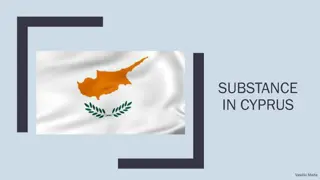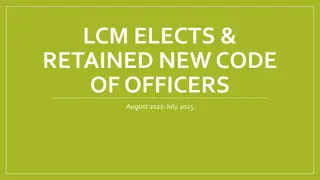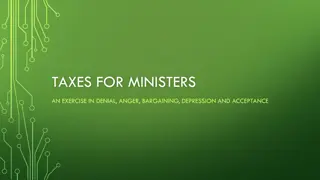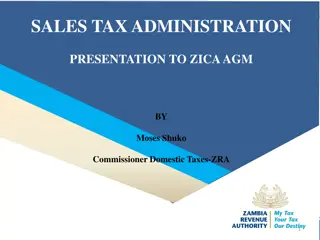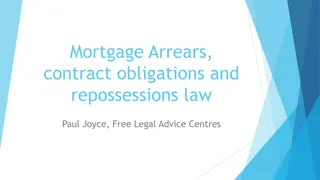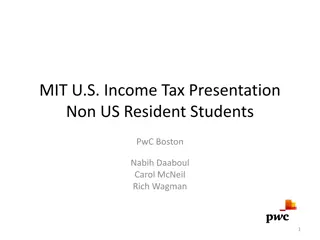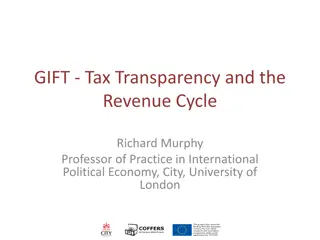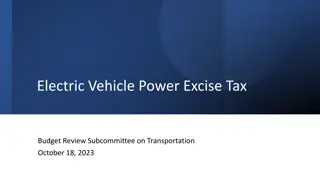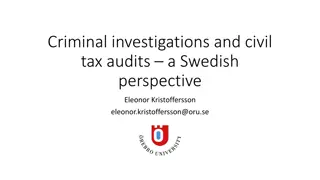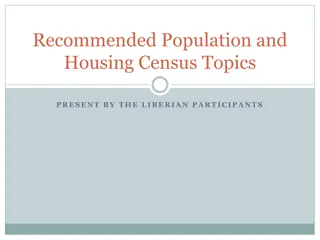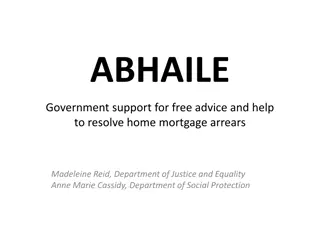Tax Arrears Collection Methods in Liberia
Explore the tax arrears management practices in Liberia as per the Liberia Revenue Code. Learn about the legal provisions, tax treatment, and debt collection procedures, including adjustment in tax credit, closure of businesses, seizure, and sale of goods. Understand when tax arrears arise and the authorities available to tax officers for collection. Discover the hierarchy of tax debt payments and the implications of non-payment.
Uploaded on Sep 24, 2024 | 0 Views
Download Presentation

Please find below an Image/Link to download the presentation.
The content on the website is provided AS IS for your information and personal use only. It may not be sold, licensed, or shared on other websites without obtaining consent from the author. Download presentation by click this link. If you encounter any issues during the download, it is possible that the publisher has removed the file from their server.
E N D
Presentation Transcript
LRA Tax Practitioner Training Module X Tax Arrears Management Liberia Revenue Authority Monrovia 2021
2 CONTENTS 1. General Introduction 2. Tax arrears collection in Liberia 3. Enforcement methods 4. Lien 5. Collection visits 6. Others Slides 4-5 Slides 6-8 Slides 9-25 Slides 26-35 Slides 36 -41 Slides 42-45
1.1 General Introduction: When do tax arrears arise? Tax arrears arise when: a taxpayer assesses his tax liability, submits return to the tax office but does not pay whole or part of it within due date established by the law. a taxpayer does not pay his officially assessed tax as a result of the tax audit on which the time for appeal has expired. a taxpayer does not pay a part of his tax liability, interest or penalties levied on him by any other ways, including jeopardy assessment.
1.2 General Introduction: Methods of tax arrears collection Tax arrears can be collected by different ways as follows: Adjustment in tax credit Deduction from debtors; (banks, government organizations or third party). Withholding of imports/exports. Closure of businesses. Seizure and sale (auction) of goods and property.
2.1 Tax arrears collection in Liberia: legal provisions Liberia Revenue Code (LRC) is the tax law of Liberia. Chapter I of the LRC has made various provisions relating to tax arrears collection. LRC provides various authorities to the tax officers to collect tax arrears from delinquent taxpayers. Tax officials may use any or all of the available measures to collect tax arrears, including any interest, penalty and costs related to the storage and sale of seized property, if any.
2.2 Tax arrears collection in Liberia: Tax treatment LRC defines tax as any tax tariff duty impost or fees imposed under it, including an advance payment and shall be subject to the assessment and collection rules as specified under the LRC
2.3 Tax arrears collection in Liberia: Tax as a debt due to the GOL Any amount of tax due is a debt due to GOL . Payments of tax debts is treated as made in the following order: interest, Penalties, and amounts of taxes. Tax that has not been paid by the due date may be sued for and recovered in any court of competent jurisdiction.
3.1 Enforcement methods: Background Tax officials may use any or all of the enforced collection methods granted the LRC to recover tax arrears. These methods may be used in any order. However, adjustment with the amount that is refundable to the taxpayers, offset from GOL bodies payments, and third party demands are relatively easier and may be applied first. These methods must be used to collect arrears within 10 years from the time the tax was assessed. ( limitation is places at 5 years for taxpayers that have submitted a tax return). Tax remaining unpaid for more than 10 years cannot be
3.2 Enforcement methods: Recovery from the third party (I) The LRC authorizes the tax authority to recover tax arrears by seizing amounts owed to the taxpayer by any third party, some examples are provided below: Collection of tax arrears from third parties: who have received a delinquent taxpayer s assets at below-market price; who owe money to the delinquent taxpayer; who is liable to make payments of salary or wages or other similar payments to a delinquent taxpayer; who are holding money for the delinquent taxpayer; who hold money on behalf of some other person for payment to the delinquent taxpayer; and who have authority of some other person to pay money to the delinquent taxpayer.
3.3 Enforcement methods: Recovery from the third party (II) The Commissioner General shall serve the payor with the notice and, as soon a practicable after that service, serve the tax debtor with a copy of the notice. The date specified in the notice must not be a date before the money becomes payable to the tax debtor, the money is held on behalf of the tax debtor, or the payor is served with the notice. A person making a payment pursuant to a notice is treated as making the payment to the tax debtor for the purposes of any claim by the tax debtor or any other person for or with respect to the payment
3.4 Enforcement methods: Example of third party demands (I) A contract exists showing that the taxpayer loaned LRD 50,000 to his brother-in-law. If the taxpayer has not paid his tax liability of LRD 30,000, this amount can be recovered from the taxpayer s brother-in-law. Mr. Yusuf receives a monthly Salary of LRD 3,000 from XYZ Company . He has not paid a tax liability of LRD 4,000. In this case, tax officials can ask the XYZ Company to pay certain amount say LRD 2,000, for practical reasons keeping LRD 1000 with taxpayer for his livelihood to the tax office to pay due taxes. In that case due amount will be reduced to LRD 2,000.
3.5 Enforcement methods: Example of third party demands (II) An insurance company is holding LRD 70,000 for the taxpayer to satisfy a lump sum policy pay-off. If the due tax of this taxpayer is LRD 50,000, tax officer can collect LRD 50,000 from the insurance company and no tax due has remained with this taxpayer.
3.6 Enforcement methods: Secondary liability for unpaid tax Where a taxpayer s liability has not been satisfied after the sale of seized property, a person who has received property of the taxpayer in a transaction that is not at arm s length in the three- year period preceding the date of the seizure proceedings is secondarily liable for the taxpayer s obligation in the amount of the value of the property received, less any amount paid by the person for such property
3.7 Enforcement methods: Offset of tax due to the taxpayer Tax officials may offset any amount of tax that was not paid by a taxpayer within the stipulated time from any amount that may be refundable to the taxpayer under the LRC.
3.8 Enforcement methods: Example relating to offset of tax due to the taxpayer XYZ Company oadvance payment of corporate income tax oin four instalments omid April omid-July omid-October omid-January oHowever, on the basis of the total transactions, the actual annual tax liability of the company was LRD 260,000. oIn this case, LRD 20,000 is refundable to the XYZ Company . oIf the company failed to withhold tax on wages/salaries in January 2021 and the total amount owed is LRD 15,000, this amount may be deducted from the overpaid tax of LRD 20,000 by the taxpayer. LRD 280,000 LRD 70,000 LRD 70,000 LRD 70,000 LRD 70,000
3.9 Enforcement methods: Offset from GOL payments If the taxpayer is in receipt of grants or subsidies or any other amount from any GOL bodies, tax officer may recover the tax due by deducting the amount of the debt from any grants or subsidies or any other amount due to the taxpayer.
3.10 Enforcement methods: Example of offset from GOL payments For example, Monrovia Construction Company was to receive LRD 100,000 from the Ministry of Finance and Development Planning on account of service provided to renovate one of the office buildings. If this company has not paid business profit tax of LRD 50,000, tax office may ask the Ministry of Finance and Development Planning to pay LRD 50,000 directly to the tax office from the LRD 100,000 due to the construction company.
3.11 Enforcement methods: Taxpayers bank account Tax officials are authorized to demand taxpayer funds deposited at a financial institution to recover tax arrears.
3.12 Enforcement methods: Temporary closure of business Where a taxpayer fails to pay tax on the due date and, after receiving a 72-hour warning notice, fails to contact the Liberia Revenue Authority to make arrangements for payment, the Commissioner General may lock and seal the person s place of business and keep it closed for not more than 5 days.
3.13 Enforcement methods: Recovery of tax from receiver (I) Tax arrears can be recovered from a receiver, who is defined as: a liquidator of a legal person; a receiver appointed out of court or by a court in respect of property or legal person; a trustee for a bankrupt person; a mortgagee in possession; an executor of a deceased individual s estate; or any person conducting the affairs of an incapacitated person; and tax debtor means the person whose property comes into the possession of a receiver. A receiver shall notify the Commissioner General in writing within fourteen days of being appointed to the position of receiver or of taking possession of property situated in Liberia, whichever occurs first. The Commissioner General may serve on a receiver a notice in writing of the amount that appears to the Commissioner General to be sufficient to provide for any tax that is due and payable as stated in an assessment notice
3.14 Enforcement methods: Recovery of tax from receiver (II) After receiving a notice a receiver: shall sell sufficient of the property that comes into the receiver s possession under the receivership to set aside, after payment of any debts having priority over the tax, the amount notified by the Commissioner General; and is liable to pay to the Commissioner General on account of the tax debtor s tax liability the amount set aside unless the Commissioner General notifies the receiver that a lesser payment will suffice. To the extent that a receiver fails to set aside a required amount the receiver is personally liable to pay to the Commissioner General on account of the tax debtor s tax liability the amount that should have been set aside but may recover any amount paid from the tax debtor.
3.15 Enforcement methods: Recovery of tax from agent of nonresident (I) Where tax is due by a non-resident person (the taxdebtor ) and the tax debtor fails to pay the tax on or before the date it is due and payable; or the Commissioner General believes on reasonable grounds that the tax debtor will not pay the tax by the date on which it becomes due and payable, the Commissioner General may by service of a notice in writing require a person who is in possession of property owned by the tax debtor to pay tax on behalf of the tax debtor, up to the market value of the property but not exceeding the amount of tax due by the tax debtor.
3.16 Enforcement methods: Recovery of tax from agent of nonresident (II) The Commissioner General may by service of a notice in writing require a resident partnership or a resident partner to pay on behalf of a non- resident partner tax due by the non-resident partner up to the amount of tax due which is attributable to any amount included in calculating the non- resident partner s income. Where a person makes a payment to the Commissioner General pursuant to a notice: the person may recover the payment from the tax debtor or non- resident partner, the person may retain out of any property including money of the tax debtor or non-resident partner in or coming into the possession of the person an amount not exceeding the payment, and no claim may be made against the person by the tax debtor, non- resident partner, or any other person with respect to the retention.
3.17 Enforcement methods: Final example of tax arrears collection In May 2012 XYZ Company was assessed for business profit tax of LRD 150,000. Recovery action can be taken until April 2022. If this amount was not paid, tax official should try to recover it though different measures as follows: oIf this taxpayer has a credit of LRD 17,000 then his debt will be reduced to LRD 133,000. oRSS payments due of LRD 20,000 may also offset tax arrears, reducing the amount of tax arrears to LRD 113,000. oHis bank account at GT Bank has a LRD 33,000 in, the bank will make payment of this amount to the LRA, reducing due amount to LRD 80,000. oIf owed LRD 10,000 by one of his customers, this will be paid to the LRA to reduce its debt to LRD 70,000, but only with the taxpayer s agreement. oSince tax is still owed, their business can be temporarily closed. o Any assets (goods, stock or other business assets) will be seized and sold. If the sale of these assets (after payment of expenses of the sale) amount to LRD. 40,000, then his debt is reduced to LRD 30,000. o Since the company still owes tax, this fact must be reported to the LRA for additional action.
4.1 Lien : Lien for taxes (I) The amount of tax arrears also may be recovered from seizure of delinquent taxpayer s immovable and movable property and auction of seized property. In this connection, a delinquent taxpayer s right of ownership and use of his or her movable or immovable property may be restricted by a lien and subject to seizure. Only that property necessary and sufficient to satisfy the unpaid tax may be subject to attachment and/or seizure.
4.2 Lien: Lien for taxes (II) Where the proper court shall, without fee, register the lien on the title of the land or buildings without fee, when it receives request from the Commissioner General to do so. A lien is released when the tax debtor pays to the Commissioner General in full the amounts that are secured by the lien, or when the period for collections has ended, whichever occurs earlier. If the lien is with respect to money or property held in trust the Commissioner General shall immediately send notice of release to the person holding the money or property. Where a lien over land or buildings is released, the Commissioner General shall file a release of the lien with the Chief Registrar and the Chief Registrar shall, without fee, remove the entry of the lien from the title of the land or buildings.
4.3 Lien: Lien for taxes (III) The Commissioner General may at any time serve on a tax debtor a notice in writing specifying any costs of lien and sale with respect to property of the debtor incurred by the Commissioner General prior to the date of service and requiring the debtor to pay those costs to the Commissioner General by the date specified in the notice. Costs of lien and sale with respect to property means any costs incurred or to be incurred by the Commissioner General with respect to creating or releasing a lien over the property, or with respect to taking possession of, holding, and selling the lined property.
4.4 Lien: Notice of seizure of assets subject to tax lien The Commissioner General may notify a tax debtor of the Commissioner General s intention to seize and sell property held by the debtor which is subject to a tax lien. A notice shall be in writing, served on the tax debtor, and specify: The property subject to a tax lien, the Commissioner General s intention to seize and sell that property, and the proposed method and timing of sale; and In the case of tangible property, the manner and place at which Commissioner General intends to take possession of the property A notice in writing is considered served on the owner of property if it has been properly served on the owner or on the person in custody of the property at the time of seizure; if it has been placed on the owner s business premises; or if the Commissioner General does not have sufficient information to identify the person on whom the notice should be served, by publication of a notice in a local daily newspaper (within two days of
4.5 Lien: Seizure of assets subject to tax lien The Commissioner General may: take possession of tangible property at any time after the notice is served, for the purpose of taking possession, enter at any time any premises described in the notice and request the assistance of the police, where the property is tangible property other than land or buildings, store the property, at the cost of the tax debtor, at any place that the Commissioner General considers appropriate, and where the property is money in the hands of another person, take possession of the money.
4.6 Lien: Sale of assets subject to tax lien (I) Sale of the property subject to the tax lien by public auction may be done as follows: where the property subject to the tax lien is land or a building, 30 days after taking possession, where the property is perishable property, one day after taking possession, where the property is tangible property other than those referred above, 10 days after taking possession, and in any other case, 10 days after service of the notice.
4.7 Lien: Sale of assets subject to tax lien (ii) If payment has not been made within given date, arrangements are to be made to hold a sale of the seized property. Every effort is to be made to ensure that all potential buyers know full details of the sale and that the greatest publicity is given to the sale. An officer from the tax office is to be nominated to be in charge of the sale. The nominated officer is to inform the delinquent taxpayer of the date and time of the sale and again give him the opportunity to pay the outstanding amount before the sale commences. If the delinquent taxpayer fails to do so, the sale is to proceed. Auction sales need to be conducted with a witness of one representative of the local government of the place where the goods in the auction sale are located or a representative of the nearest government office and if possible, the delinquent taxpayer or his/her representative.
4.8 Lien: Sale of assets subject to tax lien (III) No reserve is to be placed on the property but every effort must be made to obtain the best price possible. The nominated officer is to attend the sale and if, at any time, the amount collected for the property sold is sufficient to pay the outstanding debt, plus costs. He is to discontinue the sale and return the unsold property to the delinquent taxpayer. A receipt is to be obtained from the delinquent taxpayer for property returned to him.
4.9 Lien: Sale of assets subject to tax lien (IV) In case the goods seized are likely to decay, rot or wear out because of prolonged period of stoppage The auction sale of such property or goods should be conducted immediately. The taxpayer cannot claim for the return of the property or goods.
4.10 Lien: Proceeds of sale of seized assets subject to tax lien The proceeds of a sale shall be used to pay the costs of lien and sale of the property sold, then to pay the tax due and interest accrued with respect to that tax, and any remainder shall be paid to the tax debtor. After applying sale proceeds, the Commissioner General shall serve the tax debtor with a written notice detailing the manner in which the sale proceeds have been applied. If the proceeds of a sale applied are insufficient to pay in full the costs of lien and sale, the tax due and interest accrued with respect to that tax, the Commissioner General may proceed to collect the insufficiency with fresh actions.
5.1 Collection visits: Advance preparation for collection visits The Enforcement Sections of the Large, Medium, Small and Real Estate Tax Division of the Domestic Tax Department, LRA are responsible for contacting delinquent taxpayers to collect overdue returns and/or taxes. The Manager of the Enforcement Section: Organizes tax arrears collection visits Allocate at least two staff in a collection visit team Instruct tax officers to obtain tax returns and /or payment due and as much information as possible about the business Notifies the taxpayer in advance so that the records and books of account can be made available for inspection
5.2 Collection visit: Appointment for collection visits When making an appointment: The taxpayer is to be told that a visit will be made, not asked; He must be warned that all books and records must be made available; The proprietor or authorized person must be told to make himself available; The taxpayer should be told the visit and invited to pay the tax due. If he agrees to do so, sufficient time should be given to allow him to do so, but not more than seven days should be given without good cause. If a taxpayer has a genuine reason for requesting the visit to be delayed, or offers to pay in seven days, the officers is to arrange an alternative date after the expiry of the time allowed. If an appointment is cancelled (e.g. through illness or bereavement), the Manager of the Enforcement Section is to arrange an alternative Visit. Cancelled visits are to be recorded in the taxpayer file and he is to be visited at the
5.3 Collection visit: Preparation for visit Tax officers should study the information on the taxpayer's files and make themselves familiar with the type of business, form of accounting and any other points relevant and should have the following information before visiting the taxpayer Who to contact? Who is responsible for completing the tax return? The credibility of the taxpayer's returns. Do they appear reasonable? Which area, if any, seems the most out of line (e.g. large purchases; low sales)? Tax payment position - outstanding payments. Check with computer section to establish whether payment has been received. Outstanding problems from previous visits. Have these been
5.5 Collection visit: Conduct of visits On arrival at the taxpayer's premises, the officers should introduce themselves and confirm the business position by interview on the following lines: Establish position of the person being interviewed Ask about book keeping and accounting procedures Where are records kept; who makes the records Are the accounts audited; if so obtain the name of the auditor, Who keeps the tax account
5.5 Collection visit: Conduct of visits Ascertain and record the accounting trail Ascertain if anyone keeps additional records (e.g. Sales manager may keep records for checking salesmen's bonuses), Ascertain if taxpayer uses any other records to complete his tax return. The collection officers should then make the specific queries relating to the visit. If the reason for the visit is failure to file a return the taxpayer should be warned of the consequences, including charges, interest and penalties.
5.6 Collection visit: Report and recommendation on future action On return to the office after the visit set out above, a report is to be prepared and submitted to the Head of the Enforcement Section. The report must include the following information: Information obtained from the taxpayer The amount of tax, interest and penalties due and the amount (if any) of payments made by the taxpayer Whether seizure action is likely to be successful and Whether seizure action is recommended. The Head of the Enforcement Section has to sign and approve the visit report.
6.1 Others: Mutual international administrative and legal cooperation The Commissioner General shall determine the rules and procedures pursuant to which representatives of foreign tax authorities may assist in the application and enforcement of tax laws in Liberia and, conversely, Liberian tax officers may assist in the application and enforcement of tax laws in foreign countries, in accordance with international treaties or agreements to that effect.
6.2 Others: Collection period The period for collection of assessed tax ends 10 years after the assessment date. The statue of limitation is 5 years for taxpayers who have lodged their tax returns.
6.3 Others: Writing off bad tax debt Bad debts owed for taxes, penalties, and interest shall be written off by the Finance Minister, if the following circumstances occur: Expiration of the statute of limitations for collection of tax Cessation of the tax obligation on grounds established by the tax legislation In other cases, bad tax debts shall be written off by the Finance Minister, according to procedures established by regulations.
6.4 Others: Closing the case It must be borne in mind that the purpose of collection enforcement system is to collect taxes. All steps in the collection enforcement system must be taken to achieve this purpose alone. There is no point in choosing a particular enforcement route if there is no sufficient evidence to demonstrate that it has a high probability of being successful. It is therefore necessary for tax authorities to have as much relevant information as possible before choosing a particular enforcement option. If the payment is made by the taxpayer at any stage after the commencement of the collection process, the collection actions must be stopped, If the case is closed, the taxpayer removed from the list of delinquent taxpayers. The tax officer in charge of the collection group should provide feedback on each case to the concerned Manager of Enforcement Section.
END OF MODULE 10 ON TAX ARREARS MANAGEMNET Thank You!
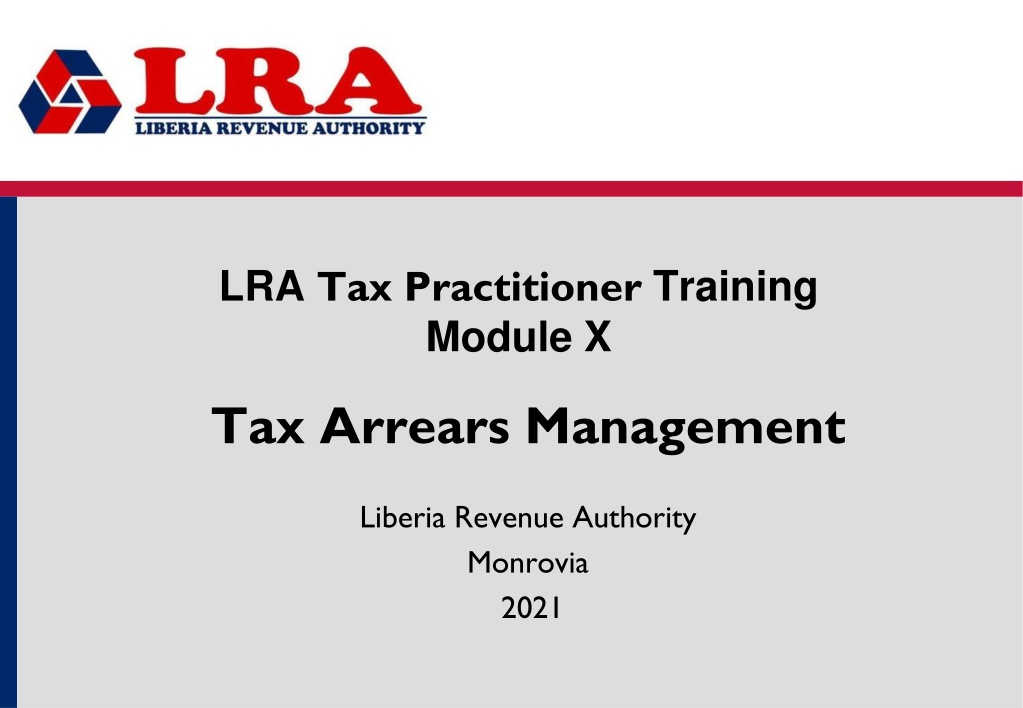


![Town of [Town Name] Real Estate Tax Rates and FY 2024 Budget Summary](/thumb/62211/town-of-town-name-real-estate-tax-rates-and-fy-2024-budget-summary.jpg)



